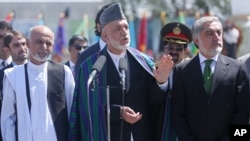Afghanistan's election crisis entered a risky new stage Monday as officials began invalidating fraudulent votes in a process likely to bring to a head the dispute raging between presidential candidates Ashraf Ghani and Abdullah Abdullah.
The country has been in political paralysis since the June 14 run-off election to choose the successor to President Hamid Karzai, who will step down as U.S.-led troops end their 13-year war against Taliban insurgents at the end of this year.
Karzai had earlier said the new leader would take over on Aug. 25, but a spokesman for the president said on Monday that date was never set as the inauguration date.
Karzai now insists the delayed inauguration ceremony must be held on September 2. The tough deadline has raised tensions between supporters of the presidential candidates.
Vote audit continues
Whatever the inauguration plan, on Monday, the Independent Election Commission was still pouring over votes cast on June 14.
In particular, the commission was due to begin throwing out, or “invalidating,” ballots deemed fraudulent in an audit of all 8 million votes cast, organized as part of a deal to resolve the stand-off.
“The Independent Election Commission is trying very hard to finish the process as soon as possible,” said its spokesman, Noor Mohammad Noor.
Abdul Rehman Hotaki, deputy chairman of the IEC, said the audit, which has not yet been completed, was a "huge logistical task" but that it would be successful.
Invalidation figures will be published daily by the IEC.
Rivals Abdullah and Ghani, as part of a U.S.-brokered deal, must form a government of national unity and cooperate on an audit of all 8 million votes that were cast to eliminate concern about widespread electoral fraud.
Afghanistan has been in a state of crisis since the disputed first round of the presidential election in April and the stand-off has dashed hopes for a smooth transition of power from Karzai, who has run the country since 2001.
The new inauguration target date of September 2, if met, would allow the next leader to take power before a NATO summit in Wales, which starts two days later.
NATO summit
Countries at the summit are due to determine how much aid Afghanistan will get after most foreign troops pull out at the end of the year.
A peaceful transfer of power would allow the United States and Afghanistan's other Western allies to trumpet a degree of success as their troops leave after nearly 13 years of inconclusive war.
But officials from the rival camps, as well as from the election commission, doubt that the September date would be met.
“Honestly, I cannot come out with something definite on that, but I hope. It's Afghanistan. Things are unpredictable,” said Abdullah's spokesman, Mujib Rahman Rahimi.
An official for Ghani's campaign, who declined to be identified, said little progress had been made in interpreting the framework for a power-sharing deal.
“Nothing yet has added to the political framework and the commission couldn't reach an agreement in most of the areas,” the official said, adding that the candidates were meeting to try to break the deadlock.
Many Western diplomats also said the process is unlikely to be resolved in time.
“I don't see how there will be any space for compromise, because the pie is too small and there are too many people who want a piece,” said one Western official.
Election allegations
Results from the June run-off put Ghani, a former World Bank official and finance minister, in the lead. Abdullah, who came out first in the first round but fell short of the 50 percent needed for an outright win, rejected the second-round result, accusing his rival's team of vote rigging with Karzai's help.
Ghani and Karzai have denied the accusation.
“Prolonging of the presidential process has affected people's daily life, particularly in security, economy and governance,” Karzai's office said on Sunday after a meeting with the candidates to urge them to cooperate.
“This must end as soon as possible.”
Some information for this report provided by Reuters and AFP.












